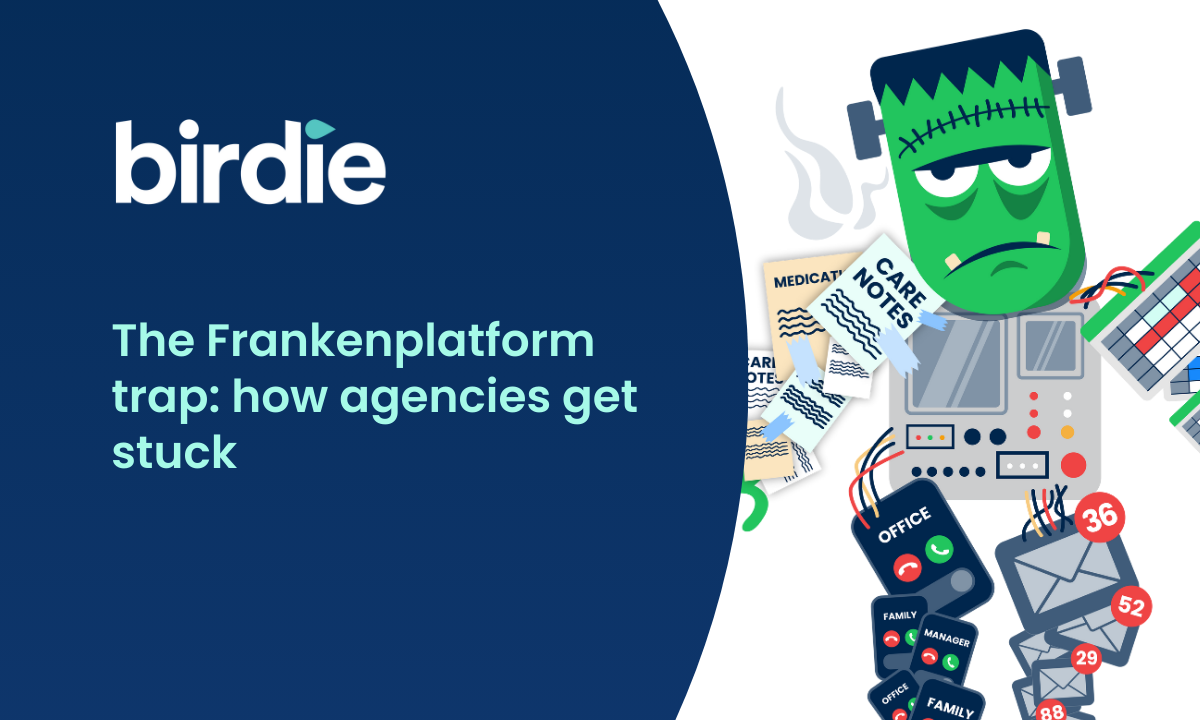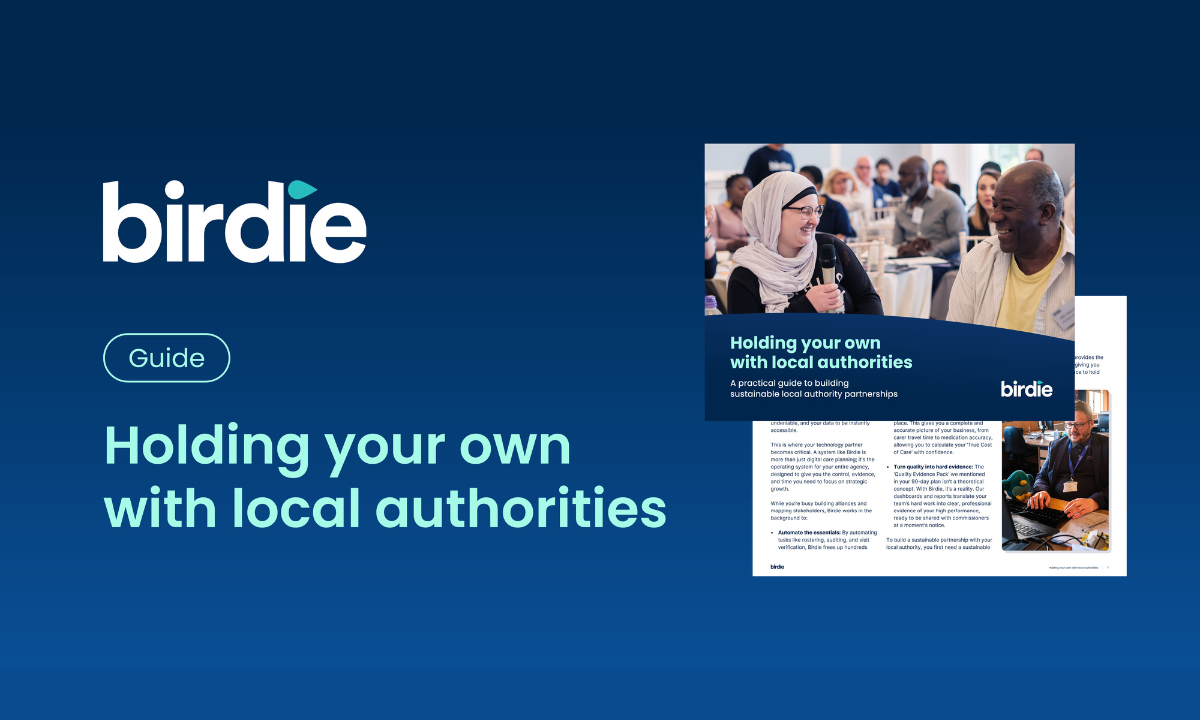Table of contents
.png)
With the coronavirus public health crisis, one of the most complex societal issues we're facing has re-emerged: the care of our elders.
We read the somber stories and infections in care homes; of frail older adults discharged from hospitals without proper care at home; of the elderly self-isolating from everyone to remain healthy.
While the government’s attention has been on supporting hospitals and the health system, social care has been left behind. There is an army of 1.6 million care staff in the UK looking after the elderly at home or in care homes. They have been dealing with tremendous pressure over the last months in an ecosystem already strained by lack of funding, shortage of staff, low wages and inefficiencies.
These heroes know that things will never be the same.
The COVID-19 crisis is forcing the care industry to evolve. With thousands of care homes affected by the virus, a study shows that 34% of families will want to keep their older loved ones at home instead of in a residential care home.
Hospitals also need to keep the elderly outside of hospitals at all costs, focusing on faster discharge and how to reduce the number of people going into hospitals in the first place.
Councils fear further budget cuts with the looming recession. And the pandemic has shed light on the dire shortage of staff to meet the growing needs for home care.
The industry will change for good to cope with these challenges.
More efficiency
The pandemic has stirred up a long-known problem: the care industry faces a massive shortage of carers, worsened by carers calling sick or self-isolating.
Several large care groups have announced that they will open 10,000 carer positions in the coming weeks - but part of the challenge is that very few apply.
Before the crisis, there were 120,000 open vacancies. With low wages and a taxing work, candidates are looking elsewhere first.
Solutions have emerged - the government has launched a campaign to entice embracing care work as a career. Yet little focus has been made on how to make care providers more efficient so that they can do more but with the same number of care workers.
One example is how much time the care sector wastes on administrative tasks, starting with paperwork. The care industry can digitise its administration and processes so that carers in care agencies or social workers at local authorities can spend time on what matters: caring for the elderly and not filling out, compiling and auditing paper forms.
With the pandemic calling for more productive care, digital adoption will help as it has helped in most other industries. Care providers will gain significant efficiency, meaning they can accommodate more demand with the same carers - and carers will be happier to do what they're paid for - caring - not reporting.
Digital also means smarter care. New tech solutions such as artificial intelligence can, for instance, enhance the matching of carers to care recipients and thereby remove wasted time in commuting between visits - precious time that can be used for delivering actual care.
The same inefficiency among care providers can hamper Local Authorities' interactions with care providers, which will only worsen with COVID-19: too much paperwork, too much duplication of activities between local authorities and care providers (e.g. assessments).
Innovative local authorities already foster the implementation of integrated digital systems - fully interoperable. This saves them and care providers a lot of time and frustration, and generates decent savings that can be purposed for new care packages.
Fixing the basics like these will unlock considerable resources.
Bring healthcare at home
Virtues of integrated health and care have been talked about for a long time - cheaper costs, more prevention, better health outcomes - but implemented with difficulty.
Health and social care budgets are fragmented among 150+ NHS trusts, 2 ministries, one regulatory agency (the CQC) and hundreds of local authorities.
Add to that 27,000 private care providers and one understands why change is hard.
COVID-19 has suddenly accelerated this path. With the urge to detect symptoms earlier and monitor hotspots at local level, local authorities and NHS services, such as discharge teams are working together.
It's a first step though. With integration between health and care, many more infections or diseases could be averted. Carers can become the eyes and ears of clinicians on the ground.
Through machine learning, carers’ observations can be aggregated and analysed to detect patterns, which when compared with the patient's medical conditions can indicate early signs of infections. Carers can be guided through online clinical workflows.
Take urinary tract infection for instance, a pathology affecting 20% of female older adults every year. By flagging symptoms early, caregivers can be guided to perform the necessary urine tests on site, and then send the results to clinicians who can diagnose the infection and prescribe medication.
The benefits are large: one could easily reduce hospital admission rates by up to 40%. To keep older adults out of the hospital, you need to bring the hospital home : testing, diagnosing, treating.
It requires social care data that is interoperable - i.e., follows the same standards as the NHS. It also involves Internet of Things devices such as motion or biometric sensors to flag emergencies and track health and wellbeing over time.
New commissioning models
With an incredible public debt mounting because of COVID-19, local authority funding for the care of their residents will be under even greater pressure than the £2.5bn funding gap that is presented today.
Local authorities will be obsessed with taking care of their older residents at cheaper cost and with better outcomes. The only viable option is for Local Authorities and Clinical Commissioning Groups to rethink the way they commission care.
Ample evidence has shown the potential of outcome-based commissioning. It's cheaper and more efficient once it's in place.
Instead of commissioning a certain number of hours of care once, it's about assessing comprehensively the needs of the care recipients, then continuously monitoring health outcomes and commissioning care packages accordingly.
Today, very few local authorities can monitor the quality of the care delivered, even less so, the outcomes of the care. It therefore requires providers to be equipped with the digital tools to track care tightly.
Then Local Authorities need to draw on that data to reassess their care packages jointly with the care providers based on evolving needs.
With more visibility, Local Authorities can commission care more efficiently and diversify the kind of support provided.
Care workers' time will often be required of course, but other recommended services could include home care monitoring technology such as motion sensors, community-based activities, companionship or a recommended diet or cognitive exercises.
Community GPs or physios would be involved. If they all operate through one technology platform, information is collected in real time, care plans can be adapted and health outcomes improved, often at cheaper costs.
Covid-19 is a systemic moment to fundamentally transform the way care is organised and delivered. The solutions are known. Their impact is extraordinarily big: they will bring many more healthy years to millions of older adults.
It's time for the industry to come together and innovate.
Max Parmentier is co-founder and CEO of Birdie. He has 15 years of healthcare experience.
Malte Gerhold is Chief Integrated Care Officer of Birdie. He was Executive Director and Board Member at the Care Quality Commission.
Published date:
July 14, 2020
Author:
Max Parmentier & Malte Gerhold
















.svg)